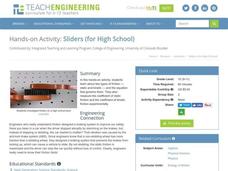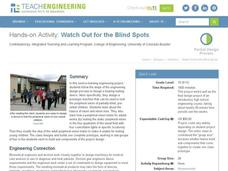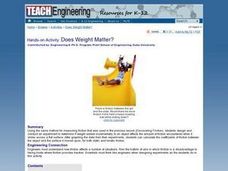Curated OER
More About Static Electricity
Students examine the concept that static electricity is a phenomenon that involves positive and negative charges. They explore the Static Electricity section of the Science, Technology and Engineering website to learn more about the...
Curated OER
Sliders - Static and Kinetic Friction
Students work in groups to conduct experiments the demonstrate the differences between static and kinetic friction. They consider how friction affects us in our everyday lives, determine the effects of weight on friction and complete a...
Google
Better Searches. Better Results.
Show your researchers how to get better results when using a search engine to find information with a template that models 10 search strategies. The suggestions explain what to type, what the search engines does, and what results users...
Curated OER
Little Engine That Could Lesson
Students read The Little Engine That Could by Watty Piper and create the trains featured in the story. For this reading comprehension lesson, students create cardboard trains resembling The Little Engine That Could, painting...
Curated OER
Engineering
Students examine how Shell uses engineering. In this engineering principles lesson students visit a web-pages, answer questions, and examine the ways that engineers go about exploring different ideas.
National Science Teachers Association
Paper Car Crash Design
High school physical scientists collide with motion. They work in pairs to design a paper car that will protect a raw egg during a head-on collision. Measurements of distance traveled, time of run, vehicle specs, and photo gate flags are...
Teach Engineering
Sliders (for High School)
Slip sliding away. Groups investigates the two types of friction by running an experiment that allows them to calculate the coefficient of static friction and the coefficient of kinetic friction. The experiment uses a box, a...
Teach Engineering
Weather Alert
Every time a bell rings ... there is lightning in the area. The activity provides directions to build a model of a lightning detection system. Similar to a system designed by Benjamin Franklin, the system uses static...
Teach Engineering
Watch Out for the Blind Spots
Applying engineering concepts to the field of medicine, pupils design a device to help test peripheral sight. The class learns and follows a specific design process for engineers before separating into groups; each group builds...
Curated OER
Static Cling
Students work together to discover the concept of static electricity. They participate in an experiment in which they test different objects charge. They make observations and record them for later use.
NASA
Missed Messages
Learners investigate the challenges of space communication with a kinesthetic modeling activity. Group members In space must communicate one word to other members on Earth while overcoming barriers such as distance, gravity, and physical...
Curated OER
TE Activity: Does Weight Matter?
Students design and conduct experiment to determine if weight added incrementally to an object affects amount of friction encountered when it slides across a flat surface. They graph data from their experiments, and calculate...
Curated OER
Little Engine That Could Lesson Plan
Students retell the story The Little Engine That Could by Watty Piper. In this early childhood lesson plan, students identify the various trains featured in the story, focusing on the descriptive words. Students then create their own...
Channel Islands Film
Magic Isle: Lesson Plan 1
What are the factors that limit growth and expansion? As part of their study of Catalina Island, class members view the West of the West's documentary Magic Isle and research William Wrigley and the Santa Catalina Island Company. After...
Curated OER
Take Charge!
Students induce an electrical charge on various objects, and experiment with electrical repulsion and attraction. They define related vocabulary, play Bingo and complete a take-home quiz.
Curated OER
TE Lesson: Factors Affecting Friction
Students investigate the effect of weight on normal friction or the friction due to surface roughness. They tell about the effects of contact area that occurs as a result of molecular attraction by looking at data on line graphs.
Curated OER
Introduction to Friction
Students study the properties of the frictional force between two surfaces in contact. They inspect various phenomena in nature where friction plays an important role and demonstrate
Curated OER
Little Engine That Could
Students dramatize traditional literature. In this retelling lesson, students practice retelling The Little Engine That Could and take on roles of the trains in the story. Students create and display train props to use during...
Curated OER
Marshmallow Towers
Students explore geometry by completing a marshmallow activity in class. In this architecture lesson, students identify the jobs of civil engineers and architects while identifying different geometric shapes as well. Students utilize...
Curated OER
An Exploration of Cradle-to-Cradle Design Thinking
Introduce cradle-to-cradle design thinking. Scholars first discuss the importance of natural laws and rights. They then use a variety of online and print resources to research eco-efficiency and cradle-to-cradle design.
Curated OER
Discovering Friction
Middle schoolers watch a demonstration that introduces them to the idea that friction is a force that impedes motion when two surfaces are in contact. They work in groups to experiment with frictional force using a coffee cup on which...
Curated OER
Help Wanted: A Lighting Engineer For Popular Rock Group
Young scholars are assigned to groups, and determine each member's role in the group. They will design an experiment to determine a way to produce the three primary and five secondary colors. Students discuss color and mood. They listen...
Cornell University
Friction
Friction and gravity are always at odds! Learners complete a set of activities to explore the relationship between friction and gravity. Groups make conclusions about the factors that affect the amount and type of friction between surfaces.
Google
Anatomy of a Search
How does Google work? That is the question answered by this printable. The four steps (search, analyze, evaluate, and rank) are detailed. A great way to launch a discussion of the strengths and weaknesses of this research tool.























